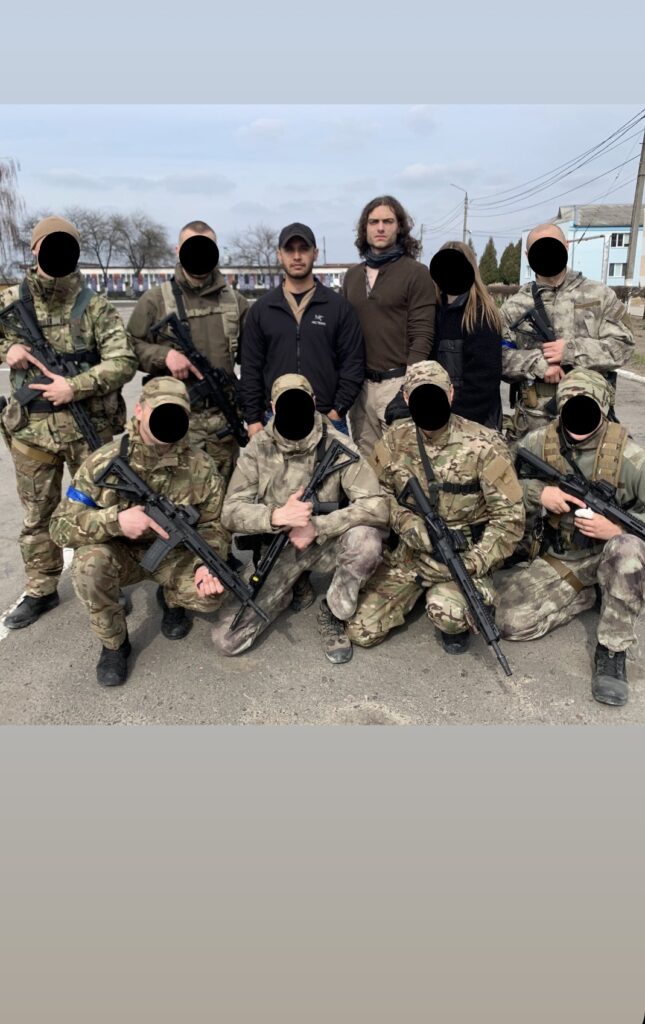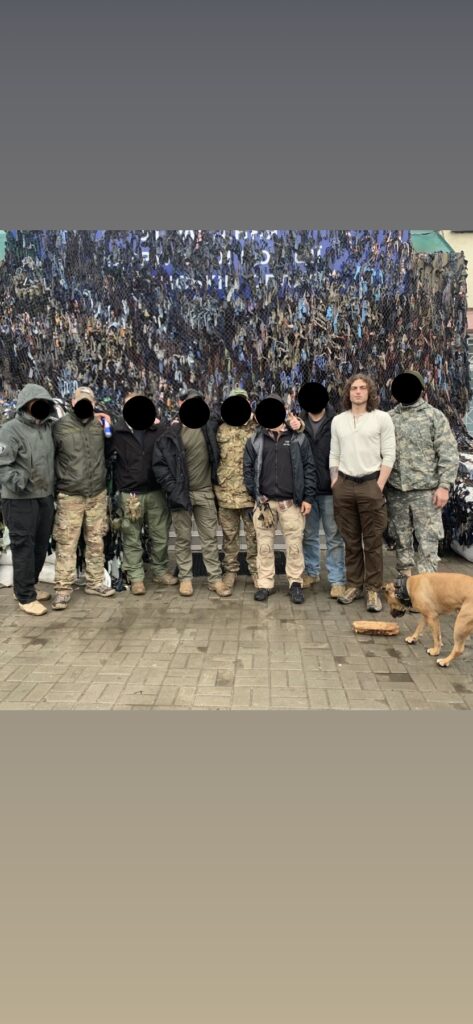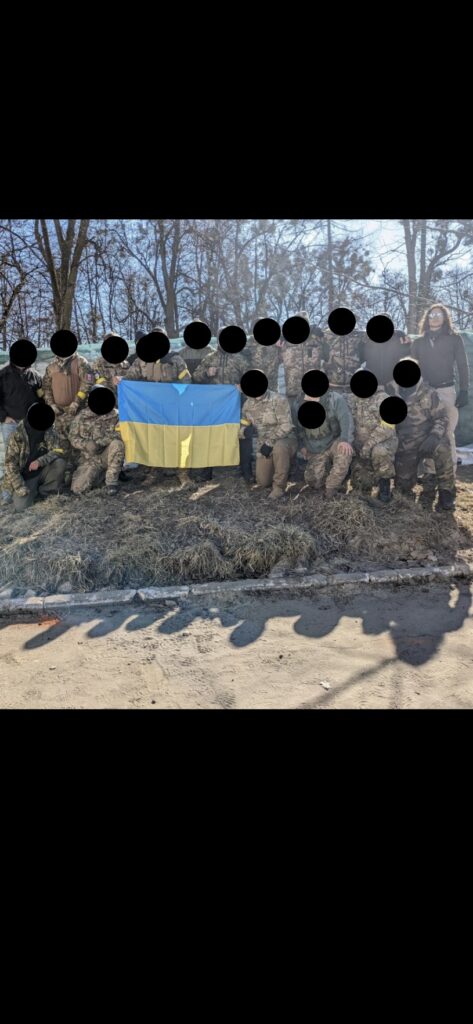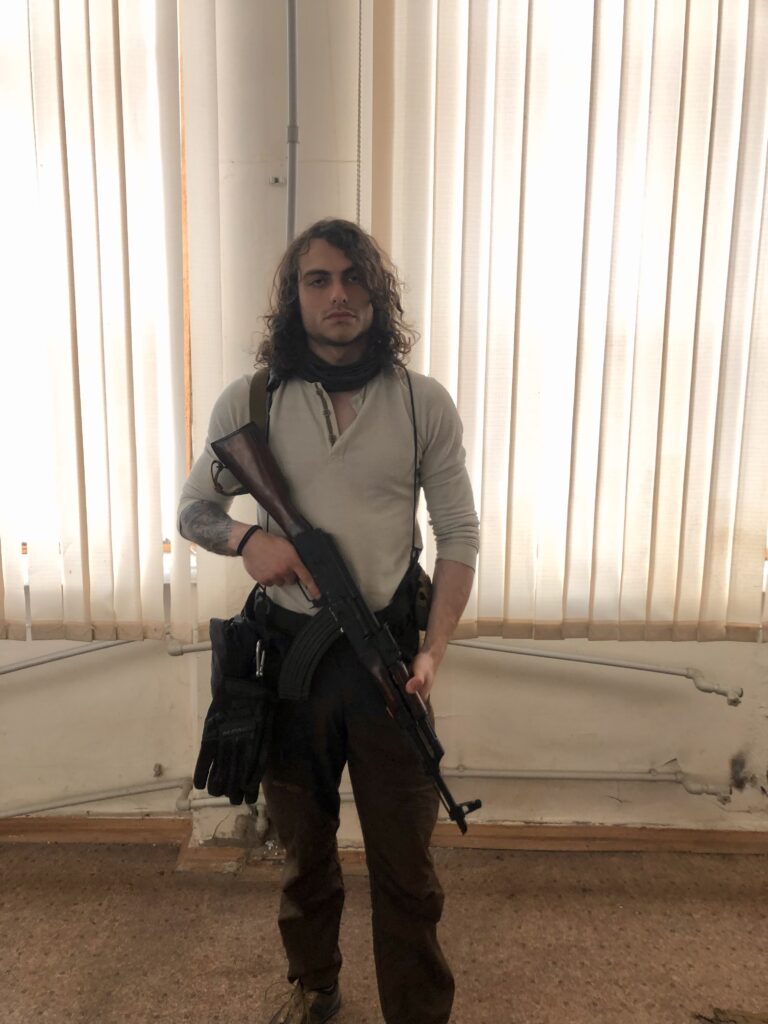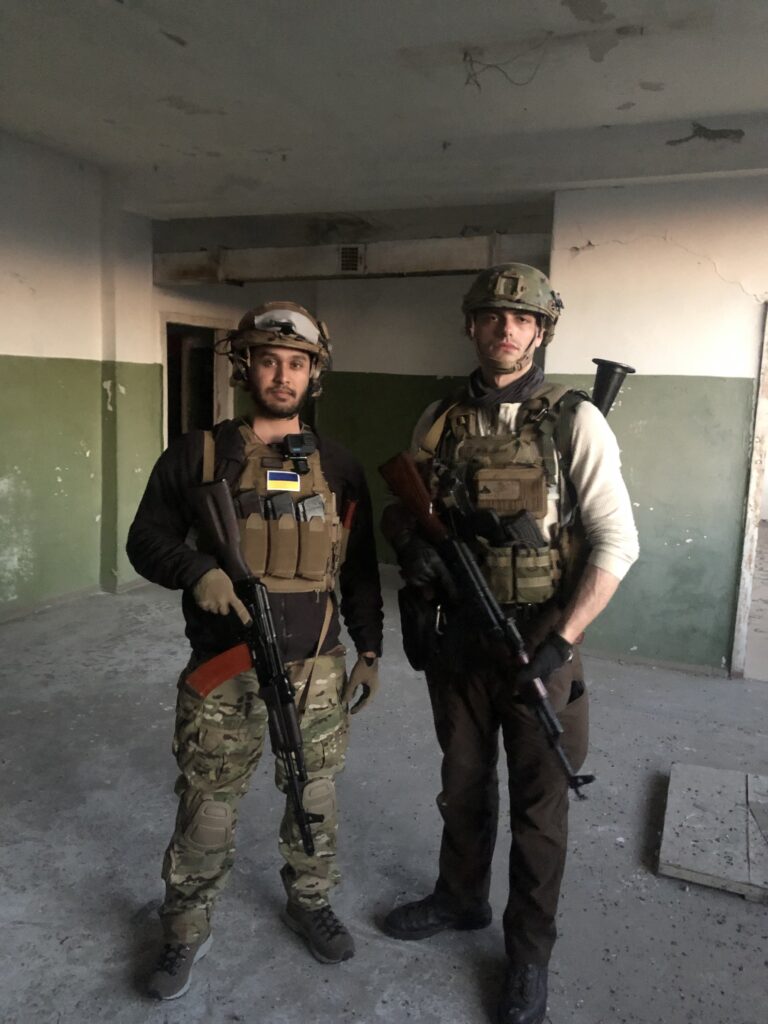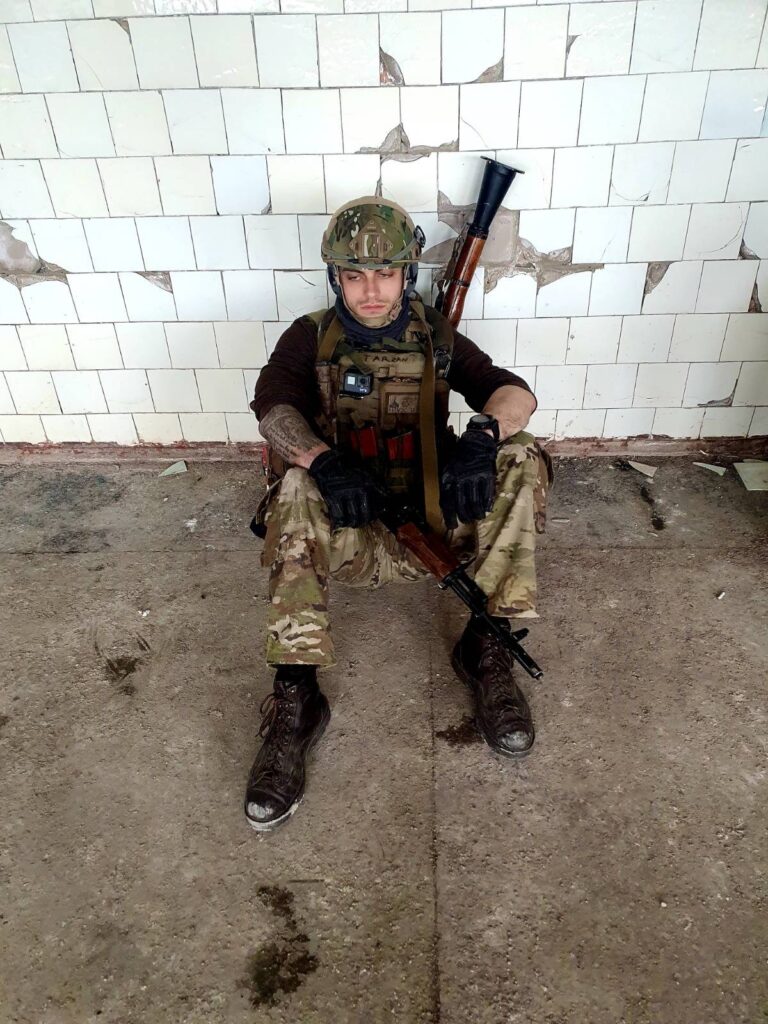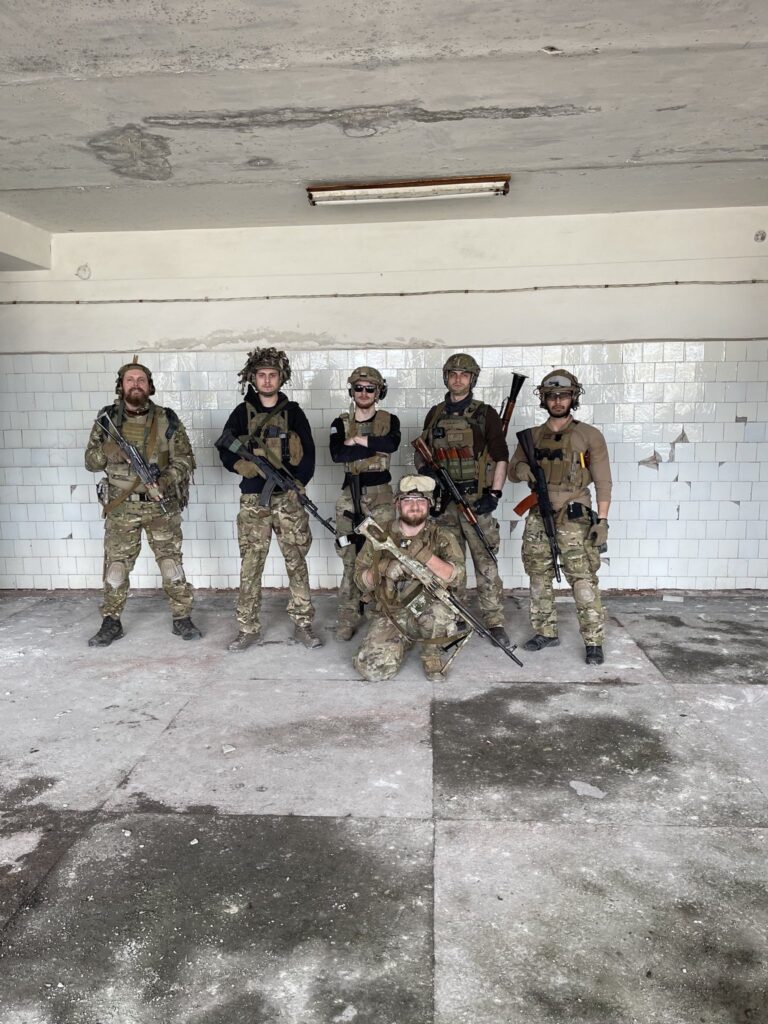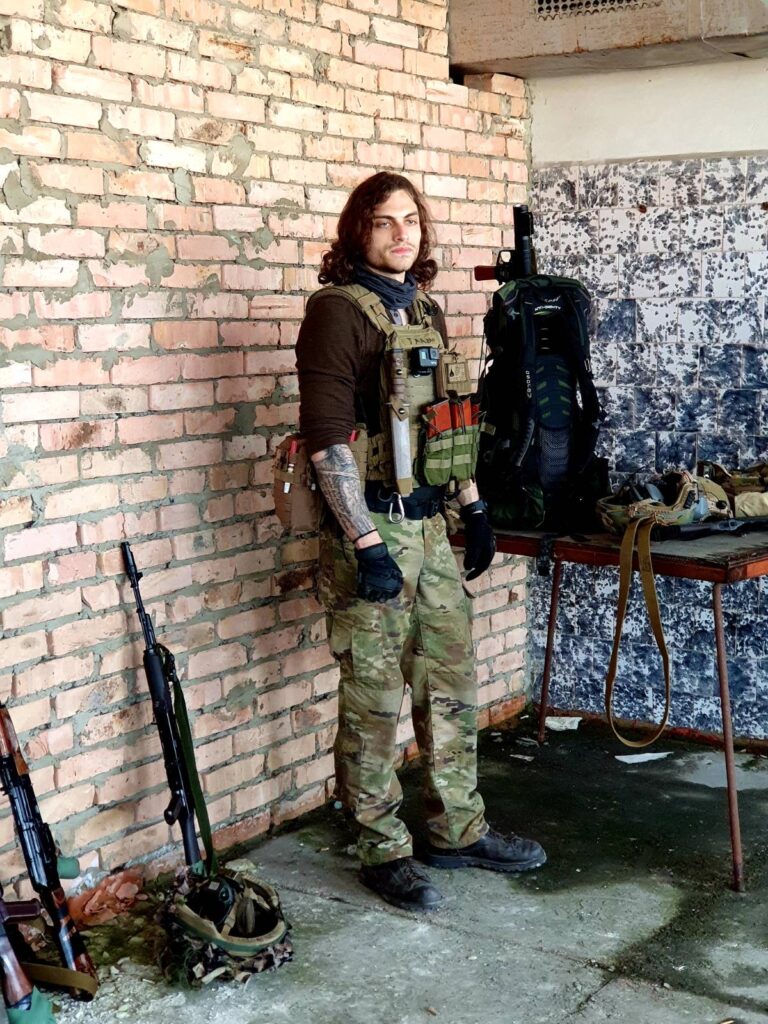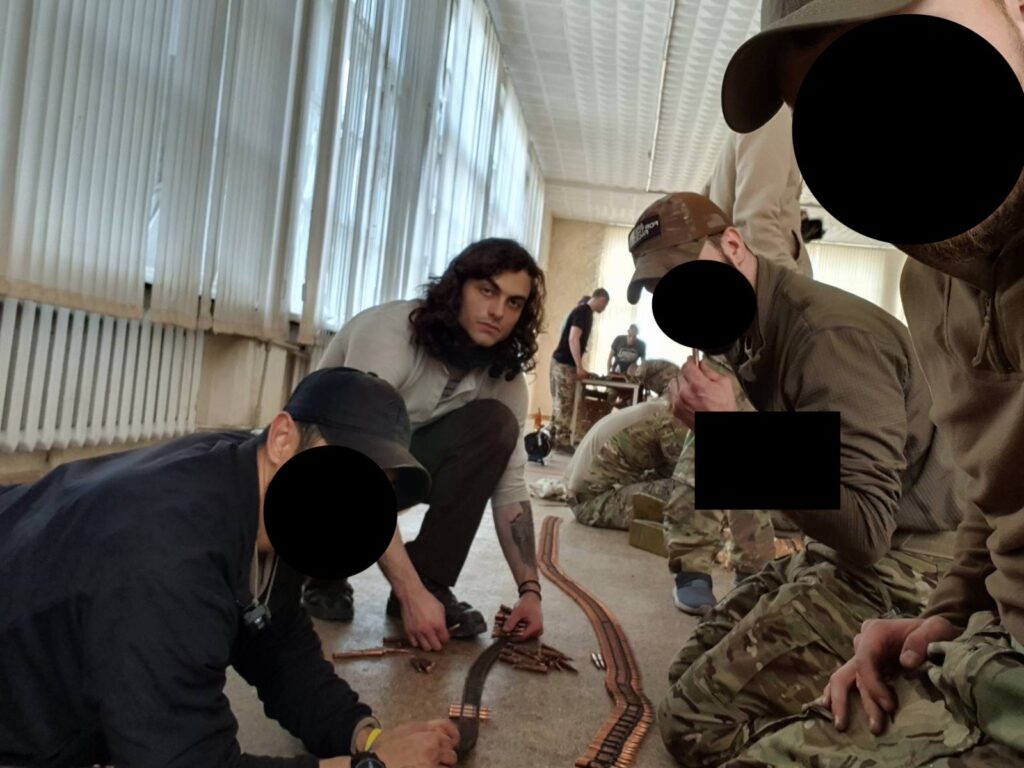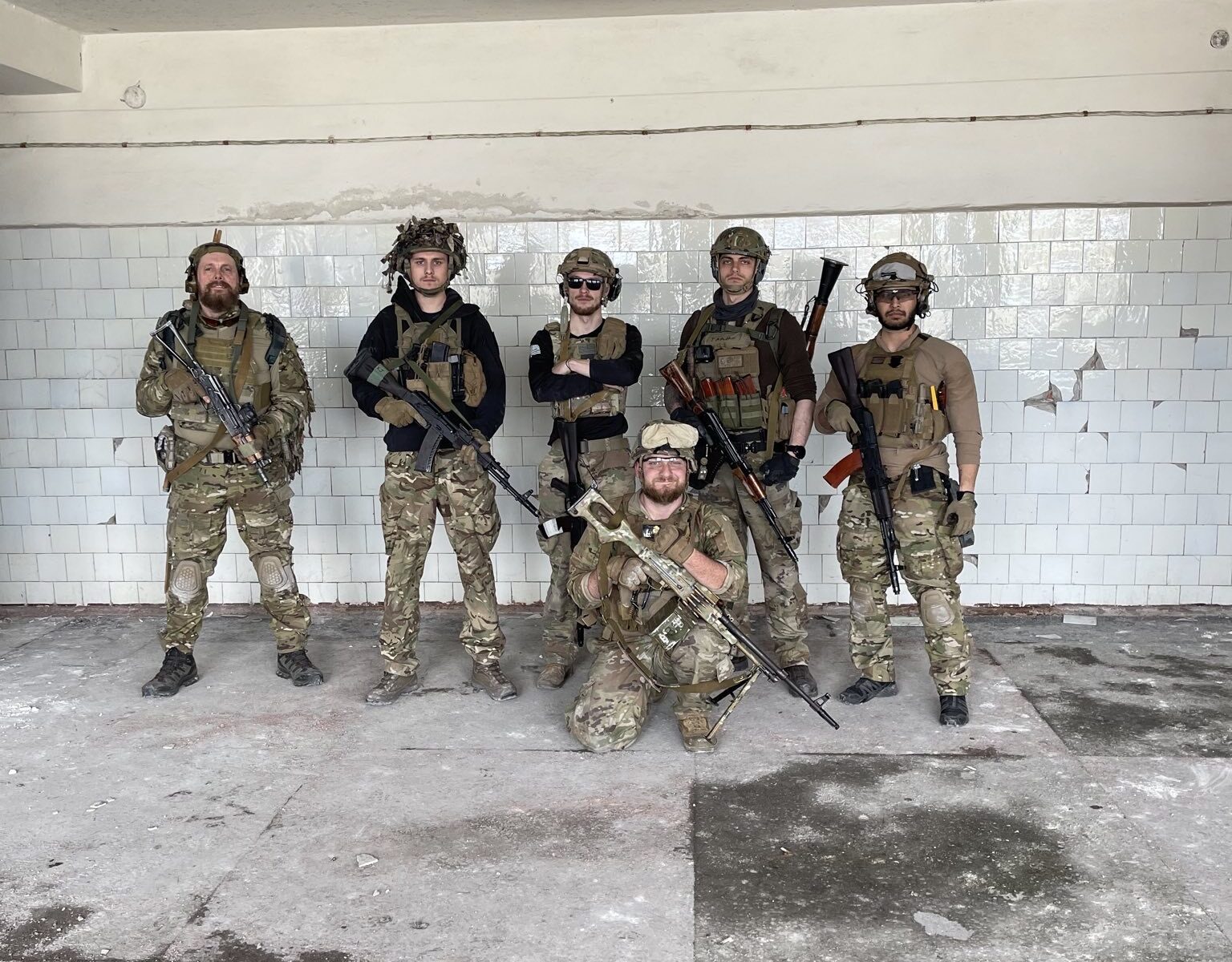We craned our necks and watched as a Russian cruise missile cut through the late March sky overhead and exploded into a building that sat an unnervingly modest distance ahead of our small convoy, snarled in traffic. In the blink of an eye, the building became yet another innocent casualty of Russia’s guilty march through Ukraine.
Our convoy held a band of battle-hardened American combat veterans returning from a Ukrainian mission. Each of us had made the journey from the States to help after hearing about the Russian invasion and to bear witness to the destruction.
This is a story about my journey from Colorado to the Eastern Front, and how the time I spent as a volunteer in the Ukrainian war challenged my belief system and shaped how I’ll approach helping defensive nations in conflicts to come.
Fort Collins
Less than a month earlier, I had been a bartender living in Fort Collins, Colorado, where I’d spent the last two years, following my discharge from military service.
On February 23rd, 2022, I was sitting in a downtown bar, scrolling through my phone when I saw the news. After months of escalating tensions, Russia had invaded Ukraine. In an instant, all plans I had for that evening – and the foreseeable future – shifted. I wanted to help.
As a former Marine Corps Infantryman, I was competent in armed combat and tactical strategies. I imagined the Ukrainian military would need volunteers, and a United States Marine is a skilled asset in any battle.
My decision to help in Ukraine might seem instantaneous, but that was hardly the case. After the 2014 Crimean Crisis when Russia invaded and then annexed the Crimea peninsula of Ukraine, I was deployed to Eastern Europe with the mission to train the United States’ Eastern European allies for a possible Russian invasion. I had firsthand experience with Russia-Ukraine relations, and I’d kept up with the news. I knew this was coming.
Sitting at the bar, I immediately began contacting former Marines I’d served with through a Facebook group chat on my phone.
I told them I was going to Ukraine, and if anyone wanted to come, they should let me know. I knew they’d feel the same way I did about the invasion and were equipped with the same skill set and desire to defend the defenseless as me.
While I finished my drink, their replies started to come in. As circumstances would have it, most of the group could not go. They cited new, more civilian priorities of life after the military: their careers, their families, and if I had to guess, enjoying good lives away from conflict. Of course, I understood.
But I was more than pleased to learn by the end of the night, two of my old friends, Mike and Andy, would be joining me in Ukraine.
Mike is a firefighter, and fortunately, he was able to put his job on hold until he returned from volunteering. Andy is a celebrity bodyguard in his home state of California. He gave his notice hours after committing to Ukraine.
A number of veterans maintain a network which enables them to stay in touch with fellow warfighters around the world. Andy is one of these veterans, and utilizing various outlets, he put me in contact with individuals already in Ukraine, who were forming an organization that would aid in the Ukrainian effort. Thus, we became a three-man team, and focused on planning our mission.
The Mission
We kept the mission simple. Mike and I would leave the second week of March, and Andy would meet us there by the end of the month. Since Ukraine did not have any commercial flights, we’d fly into Warsaw, Poland, then travel across the Polish-Ukrainian border into western Ukraine.
Once across the border, we would connect with an outfit of a little less than a thousand former veterans like us who were forming an organization to help in Ukraine. I was able to secure a spot for my team within the organization, making Mike, Andy, and I first-day members of the task force.
With foreign accommodations confirmed, the next thing we had to prepare was our cover story. The story needed to explain our travels to anyone who might challenge us, and we agreed that if we were probed about the business of our travel, we would reasonably tell them we were backpacking around Poland.
This cover story was necessary due to intel we’d received, alerting us to Russian spies in all major European airports, on the lookout for Westerners like us who were traveling to Ukraine to help fight against Russia. Because of this, using this cover story was a very real possibility and we all needed to be on the same page. I even carried a book about backpacking through Poland.
I was with friends the night before my flight left for Eastern Europe. My friends didn’t want me to leave. One friend had asked if I was sure, and said I was going to go potentially die for another country. The duty I felt toward the cause was more important than my comfort. I knew the risk, but it was the right thing to do, and when I told my friends I’d see them in a few months, there was a part of me that wondered if that were true. Would I make it back?
Poland
The flight to Warsaw was uneventful. When I landed, I met up with Mike at the airport and contacted my organization to let them know we’d arrived in Poland. They instructed us to make our way to one of their designated safe houses and stay there for the night before traveling over the border.
It was dark when we caught a cab and gave the driver the address of the safe house, where we stayed for about twelve hours before the bus that would take us to Ukraine arrived. It would take us almost 12 hours to get to Lviv, Ukraine, which functioned as a hub for international fighters, humanitarians, and journalists because of its proximity to the Polish border.
Lviv, Ukraine
We were activated to fight the first day we arrived in Lviv. However, I was waiting on body armor. I wouldn’t go to the front without protection, so I had to stay in Lviv and spent the next two weeks organizing my gear and aiding in humanitarian work.
We collected supplies for hospitals, refugees, and frontline soldiers. Medical stock was hard to come by, so we took as much of whatever we could get our hands on, packed it up and sent it off to the front lines where it was needed most.
We gathered supplies for ourselves, too – things like food, tools, optics and attachments for our weapons and protection. Anything that might increase our odds of making it out alive.
Because vehicles in Poland were more reliable than they were in Ukraine, the head of the organization, myself and another teammate went to Poland to get some more vehicles for our use. We arrived in Poland by train, but traveled back to the Polish-Ukrainian border in a white van we’d managed to secure.
While returning from Poland, we knew we had to stay calm, but alert.
Shortly after we crossed into Lviv, a cruise missile hit the factory right in front of us. Lviv was far from the front and the worst of the fighting, but it was still Ukraine, and therefore a target for cruise missiles, drone- and airstrikes. Every night, the air raid alarms would scream at least twice every hour. The barrage was constant.
We decided offering our aid was more important than a timely vehicle delivery, and we took off, weaving through European traffic in the direction of the destruction. By the time we reached the location of the cruise missile strike, the chaos was under control. Local police and EMTs had arrived. They were busy consoling their community and with no casualties I could see, they sent us back to the highway.
Shortly after returning the vehicles to our organization, we were able to take an opportunity to go to a town in Northern Ukraine to train the Ukrainian military, as well as the police unit and the town militia for war.
When we reached the location, we learned that we would be training a few hundred people, many of whom had never held a gun. We had to teach them how to stand, how to shoot, how to move together and even how to move together without shooting each other.
Fortunately, the local police chief and his deputy both had experience in war, and they taught the hundreds of others alongside my team. It was only a few weeks before Mike, Andy and I have to stop being teachers and begin moving to the front to take part in the fighting. We’d grown fond of the men we were training, and we were sad to leave them. Our departure to the East was bittersweet.
Eastern Front
On our way to the front, my team picked up some more volunteers from within our organization, taking us to a bigger squad of a little under a dozen men.
Our plan was for this new squad to travel to the southern front and stop the Russian offensive pushing into Ukraine. Due to logistical challenges of transportation, we had to split into two groups: Group 1, led by Mike, and Group 2, led by Andy and me. We decided that Group 1 would leave right away, and Group 2 would leave a week later, when transportation became available.
However, before transportation for Group 2 could arrive, an American liaison from the Ukrainian government approached our seven-man squad and invited us to form our own military unit so we might work with the Ukrainian Special Operations Forces (the Ukrainian Special Forces) in Eastern Ukraine. The opportunity to form our own unit and fight alongside the Ukrainian SOF wasn’t something we could pass up. We took the liaison’s offer, and we made our way to eastern Ukraine.
Target Location
When we reached the eastern front, we arrived in our target location: a town rife with Russian sympathizers with no consideration that the destruction surrounding them was orchestrated by the neighboring country so many of the town’s citizens praised.
The town was near the Russian border. Because of this, it was under constant artillery barrages, air strikes, missile fire, and drone surveillance. For the same reasons, the location was strategic to the Ukrainian military – they wanted to use this town as a staging area from which to deploy missions.
Our mission in this town, with the Ukrainian SOF, was to redress the balance of the conflict – taking Ukraine from a constant state of defense and helping to push them into a more offensive position. This would require unrelenting, advancing combat against Russian tanks and armored vehicles.
The Russian attacks came primarily during the night, making sleep a gamble. We typically slept about five hours each night, napping throughout the day when we were able. I never knew if artillery and missiles were going to hit the building I was sleeping in, and I was in a constant undertow of weariness, only partially sleeping, my mind beset with a scenario where Russians broke through the lines and I’d have to shoot awake, grab my rifle, and fight them off.
I developed a psychological system for dealing with this threat: If any glass broke in the buildings that my group and I were in, then that meant impact was close – too close – and I needed to get up from wherever I was sleeping and make my way to a safe area. If glass didn’t break, I could stay where I was sleeping. And if artillery or missiles hit my location while I was asleep and killed me, then dealing with that threat – or any other – would no longer be my problem.
We had received a supply of rocket-propelled grenade launchers, as well as American supplied rockets and equipment my organization was well-versed in: powerful anti-armor AT4s; one-shot, anti-tank M72 LAWs, as well as a few Javelin missiles. Because I had Marine Corps training and active combat experience using rockets of this caliber, I volunteered to carry them for my team.
It was in this town that the zeal my team and I felt during the earlier days of our time in Ukraine began to fade. This was due, more than anything, to the Ukrainian commander, Borysko, whose command we found ourselves under.
He was a thirty-something man of average height and build, with flat dark hair, a goatee that stretched down his chin, and thick fingers that tented around his mouth whenever he was irritated or thinking or both.
Borysko spoke some English, and combat, to him, was “going to work.” He was pridefully bull-headed and illogical, forcing his men to patrol at night, despite knowing they were blinded by the dark and without night vision (in contrast, the Russians had night vision capabilities, and Borysko knew this, too).
While he was perfectly content to let me carry the rockets, he only allowed his Ukrainian soldiers to fire them, telling me, “Ukraine needs to learn.” For that, I can’t fault him too much. However, he argued that we were doing things wrong in our areas of expertise and would routinely delay training until we did whatever it was his way – which was old-fashioned, Soviet, and dangerous.
To him, we were just subordinates; we had no expertise. This shocked my organization of Westerners. The Ukrainian SOF, the training ensemble near Lviv, and nearly every soldier we’d encountered prior to Borysko had all been eager to learn Western fighting techniques and develop their tactical warfare skills through our charge. They embraced us.
Yet Borysko seemed almost annoyed that we – a group of primarily Americans, Canadians, and English – were there. He had seen combat before, in the Ukrainian Army, but had volunteered to return after the Russian invasion. I respected him for that but was confused by his inconsideration that my team was much like him: volunteering to fight against the Russian invasion.
But, he kept intel from us. With a Soviet military mentality, he believed that the only individual who needed to know where the enemy was at any given time was the commander. I told him that’s how people get killed, and not something myself or any member of my team trained in Western warfare could deem tactically sound.
Despite the internal tensions, we improvised with Ukrainian supplied Avtomat Kalashnikova rifles (that’s what “AK” is short for; now you know), made do without night vision, and tried to stay focused on our mission. We worked with the Ukrainian SOF, did our best to train and practice with Borysko’s soldiers without his disruption, and confronted invading Russians throughout the day.
We used the rockets for hit-and-run attacks: blitzing the enemy forces, hitting our targets, and then getting the hell out of there. It was nerve-racking.
It was at this time that Borysko insisted his soldiers needed experience, and to allow them to fire the rockets during hit-and-run efforts. I obliged, and we continued these operations in the coming weeks, progressively migrating to a nearby town where we could utilize the natural concealment of forests and buildings, lessening our exposure when firing rockets at enemy tanks and armored vehicles.
No matter how many rockets we fired and Russian conveyances we destroyed, we were still wildly outnumbered, and my team watched as Borysko reacted by growing increasingly erratic and careless.
I was frustrated. Me, my friends, and so many others were volunteering in an effort that could cost us our lives, and this Ukrainian commander continued to force us into unnecessarily risky scenarios as if we were irritating him by helping, and giving our professional tactical advice. In his mind, it was as if we were just disobedient war volunteers and rebellious subordinates, rather than proven, successful (you’re successful if you don’t die), combat veterans. It didn’t make sense.
It was at this time that I began to lose trust in the Ukrainian leadership around us. I watched as morale declined and close calls that could have been avoided became a daily occurrence. When news of the next mission arrived, I had decided I was going to leave.
Borysko called anyone who left a “coward”, and I was sure I’d be no different. I asked Andy to come (Mike was still in the trenches on the southern front), but he still had hope that Borysko would adopt our tactical methods.
I realized I would be of a better service to Ukrainian citizens by offering humanitarian aid, and I wasn’t going to die in Ukraine because of the poor leadership of an egomaniacal commander. There is uncertainty in any war, but this was too much.
And…I was behind on bills.
The Journey Back
Within days of deciding I would leave, an unexpected and very fortunate supply delivery arrived at our base. I saw my chance and I took it. I asked the delivery drivers – an elderly Ukrainian couple – if I could catch a ride back west with them, and they welcomed me.
They didn’t speak English, and I only speak a little Ukrainian, so I used Google Translate to communicate with them. After 14 hours of driving interrupted by aggressive checkpoints (where the barrel of a gun was often pointed in my face by nervous Ukrainian guards, and I wasn’t sure if I was going to get shot), the couple dropped me off at the train station, which would be hit with a missile the day after I left.
I boarded a train back to Lviv, staying for one night in the hotel above the train station where refugees slept anywhere, they could – the lobby, the hallways, on couches and mostly the floor. They were victims in all this, and they had floors for beds. I felt bad; I’d chosen to come here – the refugees didn’t – and I was in my own room.
The next day, I left my gear – including the kit I brought with me – at one of my organization’s safe houses and I delivered what remaining medical supplies I had to local hospitals and soldiers on their way to the front.
I eventually secured a ride to the Warsaw airport and boarded a sleepless flight back to the states, leaving a total of 57 days in Ukraine behind me.
Upon my return home to Fort Collins, I was part relieved, part detached – I didn’t feel like I was really back, but I didn’t feel like I was in Ukraine anymore, either.
I kept to myself for my first few weeks back in Colorado, and when I began to reintegrate into ‘normal’ life, I started reaching out to my friends again. Many of them confessed they’d been worried for me, and unsure if they’d ever see me again – they joked that they couldn’t believe they new someone who “just volunteers in wars in their spare time.” Some called me a hero, and one friend in particular – someone I would never expect to say such a thing – told me, “You’re a good human. For going over there to kill bad humans, I mean. It was a worthy cause.”
As for my thoughts, I still grapple with the reality that I did this. I can’t speak on how it’s going to end in Ukraine, but I know that what I did was principaled. If I ever go back, my plan is to stick to offering humanitarian aid and training the military.
It seems like a movie in the way that war – for most Americans, especially – is a traditionally foreign affair, and yet here I am, having fought in two separate wars before age 26. In both of those wars, I’ve made it back home. I consider that a pretty lucky statistic, and it forces me to admit to myself that I do not need to continue doing this.
But…if not me, then who else?
We live in a world made up moral ambiguities, which seems to only fuel the battle between good and evil. It is one thing to notice this, be upset for a moment, and change the channel. It is an entirely different thing to notice this, and in doing the honorable thing, take action.
I know that my skillset is a unique one – save my brothers of war – and I will always answer the call to act against injustices, whether it comes from Ukraine, Africa, or anywhere else in the world.
No matter how we act, I firmly believe that it is important to do so. It through action that we keep evil at bay.
